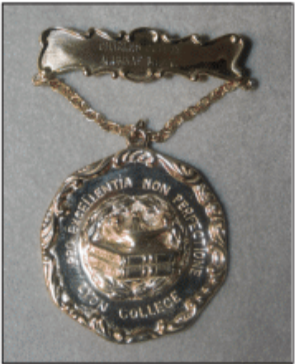
By Colton Strader
This is the first in a series of Sesquicentennial Moments that will delve into the history of Lyon College during its 150th anniversary celebration, which begins in October 2022. Lyon College will be focusing on the people, places and things that made Lyon College what it is today.
During the turn of the 20th century, university and college literary societies started to gradually lose their position of prominence in the extracurricular to athletics. These literary societies honed members’ speaking, writing, and debating skills, and added an integral element to college life, which helped keep them active in the face of growing sports. To help better recognize and distinguish members of these societies for their academic and intellectual prowess, awards were established.
It was back in 1906 that Lyon College’s, then Arkansas College, most prestigious award made its debut: the “Alumni Medal.” Established, originally anonymously, by 1884 graduate James P. Coffin, the “Alumni Medal’’ was initially awarded by the faculty to both a male and female graduate who had the highest average standing over the last three years of their college course. The award, in the form of a gold medal, represents the highest award conferred upon a Lyon College student.
The first Alumni Medal was awarded to Eula Maxfield Garrott, of Batesville, in 1906. After Coffin’s death in 1916, one of his classmates permanently endowed the award, which was renamed the Charles H. Coffin Alumni Medal. The medal would also eventually only be awarded to one senior regardless of sex, but maintained that the student must have the highest standing among the class. The Coffin Medal remains the highest honor bestowed upon a graduate of the College.
Fun Fact: The current mold used to cast the medal isn’t the original Coffin Medal mold. With the original mold being lost to time, the current die was recreated after Eugene Sloan, who graduated in 1912, loaned his personal Coffin Medal to the College so that another die could be cast.
